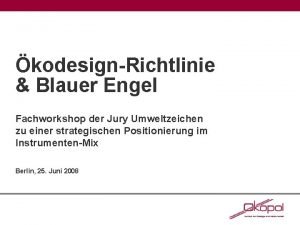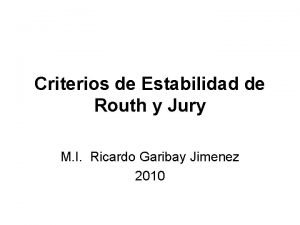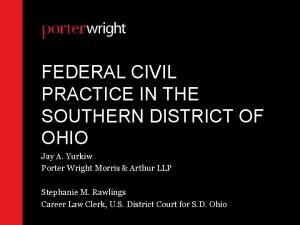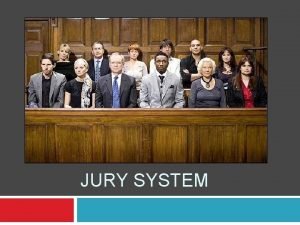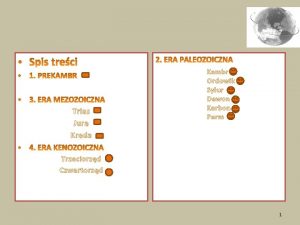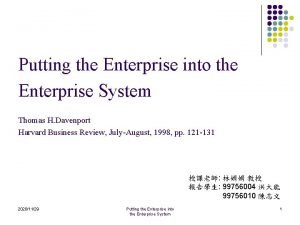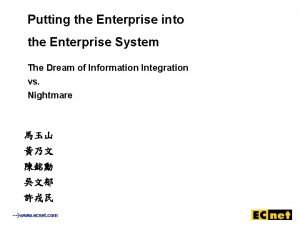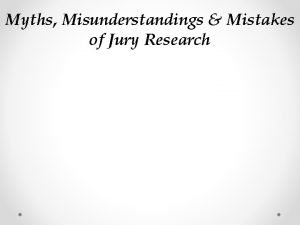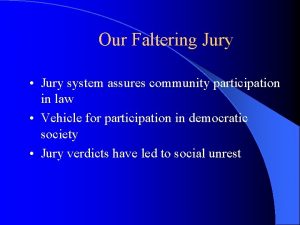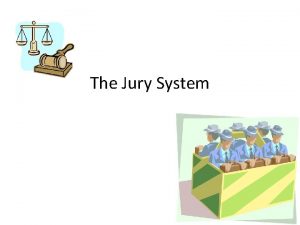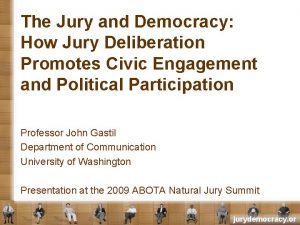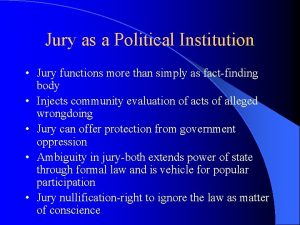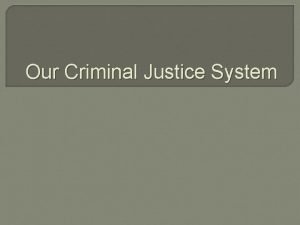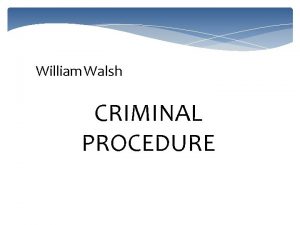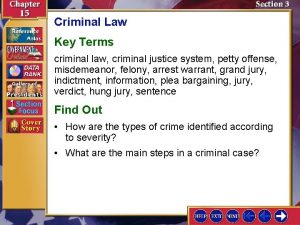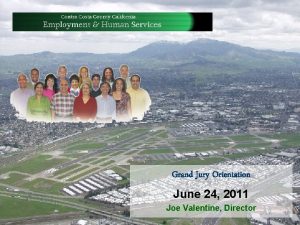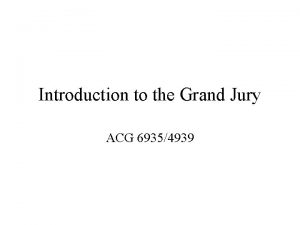Grand Jury Report On going criminal enterprise The






















- Slides: 22

Grand Jury Report

On going criminal enterprise The Department of Energy ("DOE"), its contractors - Rockwell International, Inc. ("Rockwell"), EG&G, Inc. ("EG&G"), and many of their respective employees have engaged in an on-going criminal enterprise at the Rocky Flats Plant (lithe Plant"), which has violated Federal environmental laws. This criminal enterprise continues to operate today at the Rocky Flats Plant, and it promises to continue operating into the future unless our Government, • its contractors, and their respective employees are made • subject to the law. • •

Compelling evidence • When agents of the Federal Bureau of Investigation ("FBI”)and the Environmental Protection Agency ("EPA") raided the Plant on June 6, 1989, they found compelling evidence that hazardous wastes and radioactive mixed wastes had been illegally stored, treated, and disposed ("STD") of at the Plant in violation of the Resource Conservation and Recovery Act ("RCRA").

Failure to obey the law • For 40 years, Federal, Colorado, and local regulators and elected officials have been unable to make DOE and the corporate operators of the Plant obey the law. Indeed, the Plant has been and continues to be operated by government and corporate employees, who have placed themselves above the law and who have hidden their illegal conduct behind the cloak of "national security. " Government and corporate employees have breached the public's trust by engaging in a continuing campaign of distraction, deception, and dishonesty.

Criminal enterprise • The ongoing nature of the criminal enterprise at the Rocky Flats Plant has prompted this Special Grand Jury to take three actions. First, the Special Grand Jury has approved indictments against certain current and former Federal employees, corporate employees, and corporations. Second, the special Grand Jury has made presentments to this Court of evidence of criminal conduct by certain corporations and persons. Third, this Special Grand Jury strongly recommends that the Rocky Flats Plant be closed as the only means to stop the continuing nature of these criminal acts.

Charge of the Grand Jury • The best interests of the people of Colorado and the national interest has necessitated the summoning of this Special Grand jury to inquire into criminal activity, if any, at the Rocky Flats Nuclear Weapons Plant in Jefferson County, Colorado.

Why illegal conduct continued • (a) DOE managed the Plant with an attitude of indifference toward environmental laws; • (b) DOE actively participated in and directed a conscious and ongoing effort to evade the application of certain environmental laws to the Plant; • (c) the Colorado Department of Health ("CDH") and EPA were lax and ineffective in attempting to enforce environmental laws and regulations at the Plant; and • (d) Rockwell and its successor (EG&G) - with the apparent knowledge of DOE - have excused their illegal conduct by asserting that they cannot operate the Plant without violating one or more environmental laws.

DOE’s Plant Manager • DOE's Plant Manager made false written statements with knowledge of the falsity of his statements or with a disregard for knowing whether his statements were false. For example, when the Plant Manager signed DOE's 1985 RCRA Permit application for the Plant, he had been working at the Plant less than one week, he had read none of the Permit application, and he knew virtually nothing about RCRA.

DOE denied access to Rocky Flats • From January of 1985 through the date of the FBI raid, DOE routinely denied - on the grounds of "national security" or lack of jurisdiction - virtually all requests that EPA or CDH made for their respective employees to inspect the Plant. By using DOE in this manner, Rockwell was able to shield its operations from independent inspections to determine its compliance with applicable environmental laws and to verify the accuracy of information, which DOE and Rockwell provided to regulatory agencies in support of various applications for RCRA permits, the National Pollutant Discharge Elimination System ("NPDES") Permit, and other environmental permits.

DOE Manager’s ignored evidence of environmental problems • Regional DOE managers in Albuquerque played bureaucratic games with Rockwell and local DOE officials. Although DOE’s regional employees instructed Rockwell to obey the law, they failed to budget the amounts necessary to comply with RCRA and other laws, when Rockwell advised them specifically of many of these needs. Likewise, employees at DOE's Regional and Headquarters Offices did not follow up on their instructions to assure that the Plant was operated in compliance with applicable environmental laws.

EPA ignored environmental problems • EPA's employees, likewise, did not always act responsibly in exercising their regulatory authority over the Plant. For example, EPA learned during the summer of 1988 that Rockwell was spraying massive volumes of treated wastewater effluent onto the east trenches. However, EPA waited 18 months (until January of 1990, when EG&G began to operate the Plant) before EPA bothered to inquire about the appropriateness or legality of this practice.

Bureaucratic form over substance • In a classic illustration of bureaucratic form over substance, CDH and EPA have elected not to argue with DOE's Position on the beryllium, which remains in the air ducts. Although argued that the beryllium dust in the to human health, DOE has Plant's ventilation system beryllium dust is extremely hazardous therefore - in DOE's opinion, not subject to RCRA regulation, although it is possible that workers may be breathing the dust "been generated" as a "waste" within the meaning of RCRA. It is exempt from RCRA regulation because the beryllium has not and it is possible that the dust may escape to the atmosphere outside of the Plant.

Should government employees be held responsible for criminal acts? • Employees of DOE and other government departments and agencies defended themselves at various times before this Special Grand Jury by asserting four arguments. First, some government employees asserted that they were immune from prosecution for their criminal acts. Second, some claimed that they did not personally direct the illegal STD operations at the Plant and, therefore, they should not be held accountable for criminal conduct. Third, some government employees suggested that their incompetent and negligent mismanagement of the Plant were not crimes. Fourth, many of them told the Special Grand Jury that they were ignorant of the law or relied on faulty legal advice and, therefore, they should not be held accountable for their criminal acts. The Special Grand Jury rejects each of these defenses.

Are government employees immune from prosecution? A. Yes B. No C. More information is needed

Are government employees immune from prosecution if they did not personally direct the illegal activity? A. Yes B. No C. More information is needed

Are government employees immune from prosecution for incompetent and negligent mismanagement which is not a crime? A. Yes B. No C. More information is needed

Are government employees immune from prosecution because they were ignorant of the law or relied on faulty legal advice? A. Yes B. No C. More information is needed

Should National Security plants be exempt from environmental law? A. Yes B. No C. It may depend on the circumstance

Should the President be able to exempt a National Security facility from environmental laws? A. Yes B. No C. More information is necessary (DOE never asked)

Should DOE and Rockwell have RCRA permits? • With regard to residues, which have been treated and stored at the Plant, DOE, Rockwell, and certain employees of each of them violated RCRA on virtually a daily basis between the effective date of RCRA and December 31, 1989 (Rockwell's last day managing the Plant) by: (continue next slide)

• (a) failing to report to EPA that they were storing the mixed waste residues at the Plant; • (b) storing certain mixed waste residues at the Plant for longer than one year although there was no technology available to treat the residues or extract the plutonium from the residues; • (c) storing certain mixed waste residues at the Plant for longer than one year although processes were known to exist by which the hazardous constituent could have been treated and the plutonium could have been extracted from the residues; and (d) engaging in the practices discussed in subparagraphs III. C. 3. , III. C. 4. , and III. C. 5. above.

Indistinguishable Co-conspirators • From the perspective of this Special Grand Jury, Rockwell and DOE were indistinguishable coconspirators to violate RCRA. Rockwell used DOE as a shield against environmental reporting, regulation, compliance, and enforcement. • Rockwell skillfully and in complicity with certain DOE officials conspired over a period of years to hide its criminal acts and the criminal acts of its employees behind the sovereign immunity of a department (DOE) of the Federal Government. Some DOE employees, likewise, became a law unto themselves and attempted to immunize themselves from prosecution by hiding behind the sovereign immunity of the U. S. Government.
 Lve
Lve The writ of habeas corpus and the grand jury both
The writ of habeas corpus and the grand jury both If you are going through hell, keep going means
If you are going through hell, keep going means Whats a hung jury
Whats a hung jury Hurwitz polynomial
Hurwitz polynomial Setting of a jury of her peers
Setting of a jury of her peers Jury verdict form
Jury verdict form Not only the students but also the instructor
Not only the students but also the instructor Hyperbole in the cask of amontillado
Hyperbole in the cask of amontillado Jury vs judge
Jury vs judge Jury umweltzeichen
Jury umweltzeichen In his speech to the jury, atticus says he feels pity for
In his speech to the jury, atticus says he feels pity for National research staffing mock jury
National research staffing mock jury Soutenance mémoire infirmier 2020
Soutenance mémoire infirmier 2020 M.i. ricardo garibay jimenez
M.i. ricardo garibay jimenez Jury.ohsd.uscourts.gov
Jury.ohsd.uscourts.gov Gabungan tenaga penjualan
Gabungan tenaga penjualan Jury nullification
Jury nullification Tom angers mr. gilmer and the jury by
Tom angers mr. gilmer and the jury by Jury system advantages and disadvantages
Jury system advantages and disadvantages Perm jura
Perm jura Putting the enterprise into the enterprise system
Putting the enterprise into the enterprise system Putting the enterprise into the enterprise system
Putting the enterprise into the enterprise system










